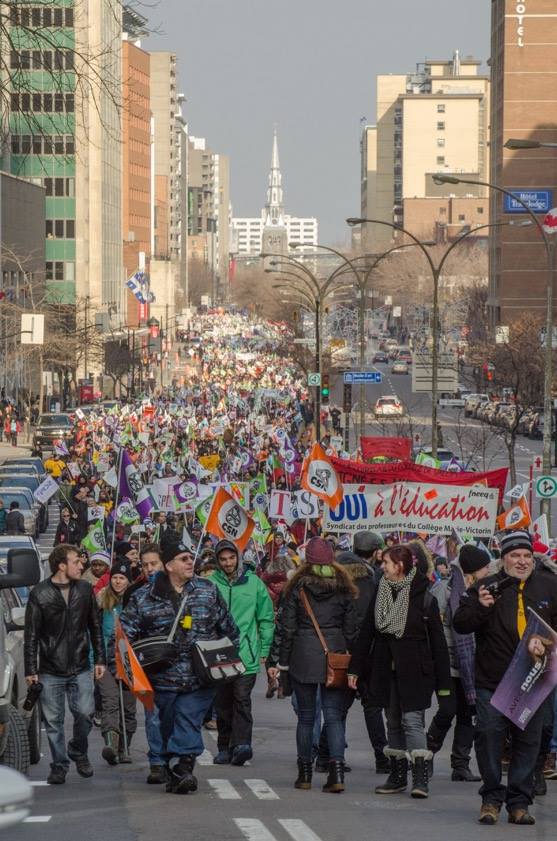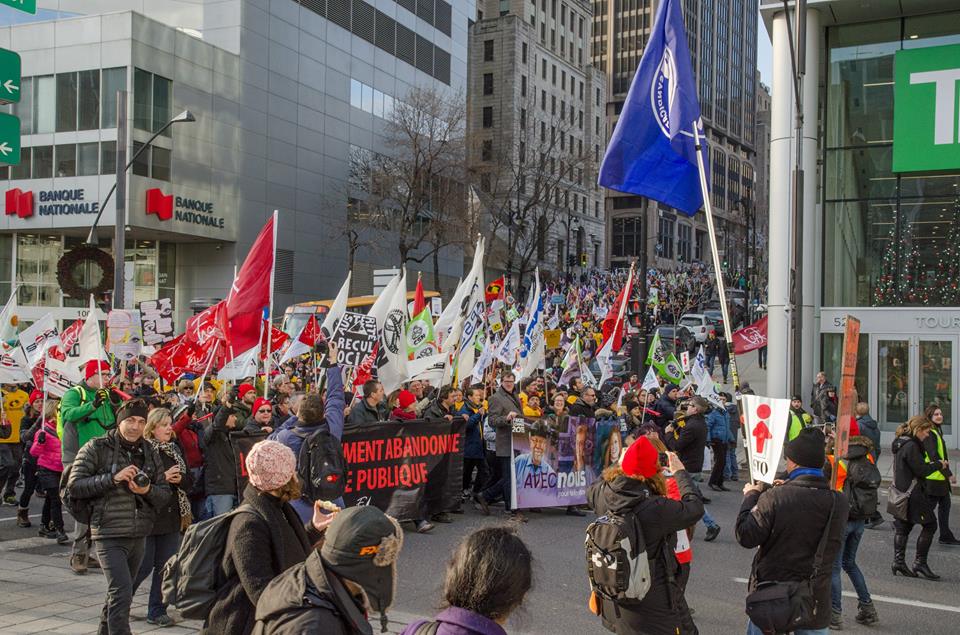rabble is expanding our Parliamentary Bureau and we need your help! Support us on Patreon today!
A historically high number of public service employees were on strike and protesting in Quebec on Wednesday Dec. 9. Unresolved contract negotiations with the government were the flashpoint leading to the day’s unrest.
“It is the biggest [Quebec] national strike since 1972 in the public sector. There were 210,000 on strike at the same time in 1972. Today it’s more than 400,000” said Jacques Létourneau, President of the CSN, the union representing the largest contingent of the Front commun, a grouping of large unions.
The labour strike caused many schools and public services to shut down. Essential services, like hospitals, remained open.
Actions were held all over the province, from Nunavik in the north to the Gaspésie in the east and Gatineau in the west to Quebec and Montreal in the relative south.
Three large demonstrations took to the streets in Montreal. The two organized by unions during the day met up to form one large group of many thousand cheering through the streets en route to hearing speeches.
A more radical non-union group called a night demo which was broken up fairly quickly by police. Windows were broken by demonstrators and many canisters of tear gas were launched into the crowd by police at a major downtown intersection. An uninvolved Concordia professor reports having been beaten by police while walking home from work.
The lead-up
There have been many protest actions in recent days and weeks. Night demonstrations were held by non-union groups, like a feminist all-women’s demo on Tuesday, Dec 8, and one on Nov 30. Both were quickly and forcefully shut down by Montreal police, the SPVM.
The Front commun unions, while more subdued, have nonetheless been noisy and visible. They were ramping up toward three big days of strike at the start of December. Instead, hoping to show good faith in submitting a counter-offer to the Quebec government, they cancelled the days, tentatively calling for one day of strike on Dec 9 if no agreement had been reached by then. Their counter-offer was thrown in the trash by the government 30 minutes after having been received on Nov 18, and so strikes were planned and held on Dec 9.

Photo: Travailleuses et travailleurs du secteur public
Public employee contract negotiations have been dragging on for nearly a year. Some agreements on specific items were made recently at the bargaining table, but salary is the biggest point of contention and remains unresolved.
The government has been offering an increase of three per cent over five years with a freeze for the first two years. Unions are looking for an increase of 13.5 per cent over three years, or 4.5 per cent per year.
The moving pieces
If it seems like there are lots of different groups involved, it is because there are. Four notable groupings of unions have been showing their colère (anger or discontent) this week, including on Wednesday. And that doesn’t include community groups, students, and other non-union groups like International Workers of the World.
The largest of the four union groupings is the Front commun, which itself is a grouping of large Quebec unions. The Front commun makes up the bulk of those in contract negotiations with Quebec, mainly healthcare and education workers.
The FAE (Autonomous Teaching Federation), representing 34,000 education workers, were on strike Wednesday and continue through to Friday. The FAE held actions on Thursday morning, keeping the energy from Wednesday going. Some members are camping for a few days outside the Minister of Education’s office in Montreal, with the slogan “Save Public Schools.” The same slogan was featured on a banner at the front of their large demonstration in Montreal on Wednesday.

Photo: Travailleuses et travailleurs du secteur public
White collar municipal workers in Montreal, represented by the SCFP, were on strike Wednesday afternoon, causing a number of services like courthouses to shut down. The city’s blue collar workers held an illegal work stoppage on Tuesday for a general assembly. The Mayor, Denis Coderre, says there will be zero tolerance for that action. The union may be fined $10,000 to $25,000 and individual workers between $25 and $100.
Also of note, the union representing 2,000 student workers at UQAM (University of Québec in Montréal), SÉTuE, has been on strike this week. This has raised tensions on the already charged downtown campus, which has been a hotbed of protest and more recently of repression from the university administration.
SÉTuE’s strike of student workers potentially jeopardizes the end of the fall term. The union has not had a collective agreement since the end of 2013. Some speculate that their strike action may galvanize and embolden student dissent. Students, often a formidable force in Quebec, have stayed mostly unaffiliated and uninvolved with the union mobilization this fall.
Various night demos have been organized by non-union groups. The Dec. 9 night protest was organized by Printemps 2015 (Spring 2015), the group open to anyone (but which became something of a clique) that was very prominent in the winter and spring. The name of the protest was “Our Struggle Is Not Negotiable!” This title can be read to refer to the government, saying that the end of labour negotiations is not the end of the movement, and also read as a message to the unions who have been criticized, as unions often are, for very narrowly focusing on their salaries and not on the austerity measures stripping away Quebec’s social fabric.
What the anti-austerity movement in Quebec will look like after public employee negotiations are concluded is a matter of speculation. Until that happens, unions will be applying pressure and further strikes are in the works.
David Gray-Donald is a freelance journalist and community organizer in Montreal and Toronto.



